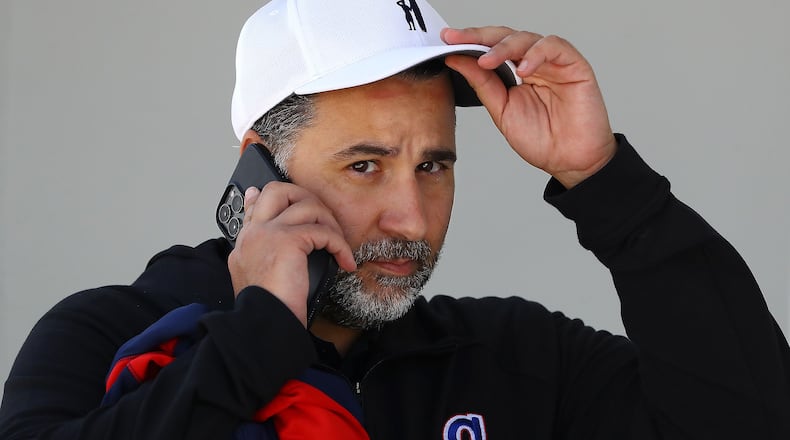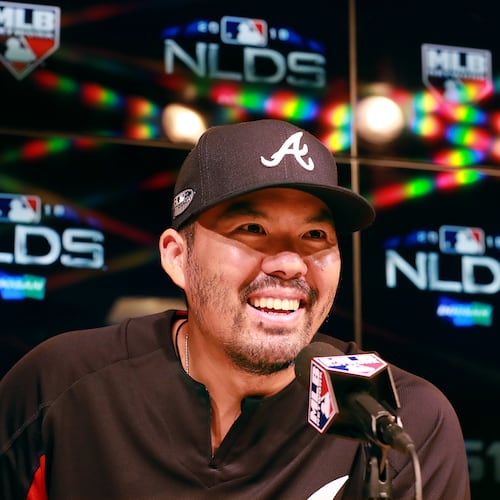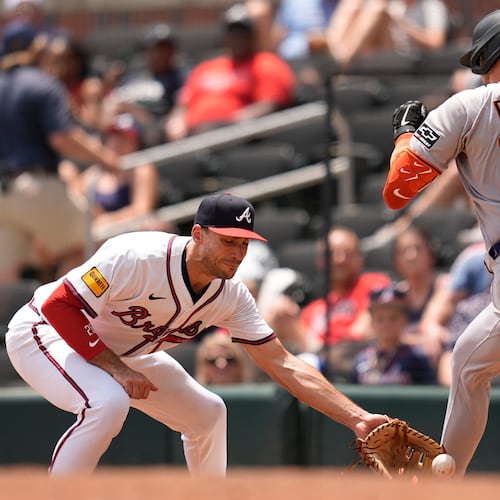DALLAS – As the World Series approached its conclusion, the Braves received more clarity on Ronald Acuña Jr. and Spencer Strider: The two rehabbing players would not be ready for opening day in 2025. And around the same time, the club learned more about Joe Jiménez, who needed knee surgery and would be sidelined for a significant chunk of the season and would possibly miss its entirety.
These situations impacted Atlanta’s thinking. Consider this: At the beginning of the offseason, teams know the free agents that winter, but cannot entirely predict the trade market. And as this offseason began, the Braves only knew they had needs to fill, which drove their decisions to create payroll flexibility.
They restructured the contracts of Reynaldo López and Aaron Bummer. They traded Jorge Soler. They declined the club option on Travis d’Arnaud. They non-tendered Ramón Laureano.
The Braves did not want to make those financial commitments and then need to turn down opportunities that presented themselves this winter.
“Timing, it’s one thing you can’t control,” Atlanta president of baseball operations and general manager Alex Anthopoulos said on Sunday. “You have decisions to make, you have deadlines, you gotta take the information you have at that time and make adjustments along the way.”
Clubs must decide on options by five days after the conclusion of the World Series. The tender deadline is later in November. If those deadlines were on Jan. 1, Anthopoulos said, the Braves might’ve made different decisions.
They didn’t have that luxury.
So now they’re attacking their offseason. They have needs: An outfielder, a starting pitcher and bullpen help. How much money can Anthopoulos spend? We don’t know. And he’s not going to say it publicly because that would be a competitive disadvantage.
He did say this much: Once again, the luxury tax threshold will not deter the Braves this winter – even if there are steeper penalties for going past it for a third consecutive year.
The luxury-tax threshold for 2025 is $241 million. The Braves, who have exceeded the luxury-tax mark two years in a row, sit around $217 million in luxury-tax commitments for 2025, according to FanGraphs. That leaves them with around $24 million to spend before crossing the threshold.
If the Braves surpass it for a third consecutive year, they’ll be taxed 50% on the overages – every dollar above $241 million. Dipping under the luxury-tax threshold resets the penalties. And if teams go $40 million or more over the threshold, they are taxed another surcharge and their highest selection in the next year’s MLB Draft is moved back 10 spots unless the pick is in the top six. (The Braves won’t be picking in the top six for the foreseeable future.)
“I think the big stuff with that is if you’re losing draft picks or all that kind of stuff,” Anthopoulos said. “Dollars still matter, of course. But it’s a tax, right? It’s just a percentage that you’re going up. And it’s for every dollar over. You’re aware of it, but it doesn’t stop you from doing anything. The right opportunity presents itself, we’ll do it – if it’s the right deal. I think like anything, you’re mindful of it, you’re always aware, you’re aware of everything. I think the one area would be, OK, if we’re going to start to lose draft picks and things like that – those are things that you’ll probably consider more. That doesn’t mean you won’t do it as well. We’ve signed (qualifying offer) free agents and things like that.
“But no, I’d say that the tax and things like that, it’s just a math equation, it’s just dollars spent. You have X amount of money to spend, you’ll bake it in and that’s part of our total spend. So whether it’s first, second, third time, obviously the tax rates go up, first tier, second tier, third tier and so on, you just account for it. But it hasn’t prevented us from doing things in the past.”
The Braves won’t be losing draft picks here – unless they sign a player who received a qualifying offer from another team and rejected it. The luxury tax is tax overages and a potential change in draft position for that first pick.
In 2024, according to FanGraphs, the Braves came just under the third luxury-tax tier, which is what costs a team 10 spots on its highest selection in the draft. FanGraphs had Atlanta at $276,995,508. That math could be slightly different than the team’s books, but the gist is correct. Remember: After the trade deadline in the summer, Anthopoulos said the Braves projected to stay under that third tier.
How does Anthopoulos view the draft pick moving back 10 spots and how would he factor that into spending decisions?
“A lot of times, as you remove yourself from the first round, everyone’s board looks totally different. Even in the first round it looks totally different,” Anthopoulos said. “We did not expect (2024 first-round pick) Cam) Caminiti to get to us, which is just a reflection of how different everyone’s board is. So you start getting that much farther out, for me – just speaking for myself – 10 picks is not a big deal. At the end of the day, you have a chance to make your big-league club better, and you’re not losing the draft pick, you’re just moving back. You still have your draft pool, you still have the pick. Probably a pretty good chance that the guy you’re earmarking has a good chance of getting to you at that time. And again, the whole point of the draft is to either get players that will hopefully become major-league players or be used to trade for major-league players.
“So, if we’re using a mechanism that we know will yield major-league impact – that’s why we’ve done it, we’ve given up draft picks. That wouldn’t stop us at all, that’s what it’s there for. Sure, you’re hoping you get the next great young player. Look, we’ve traded prospects. That’s not a deterrent for us.”
The point in all this: If something makes sense for the Braves, they’ll do it. Anthopoulos receives a number from up above (Liberty Media) on what he can spend the next year. He makes it work the best he can. In this case, that means he’ll factor the luxury-tax penalties into the spending for that next year.
The Braves have Acuña, Strider, Austin Riley, Matt Olson, Michael Harris II signed to long-term deals. If the Braves exercise the club options on Acuña and Ozzie Albies’ deals, they’ll be with the club through at least 2028 and 2027, respectively.
They can win now.
And win a few years from now.
They’re set up well. They just need to spend the money to build the best roster to do so.
At the beginning of the offseason, Anthopoulos said the Braves’ payroll will increase from where it sat on opening day this year.
On Sunday, he made it seem like the Braves won’t be scared of surpassing the luxury-tax threshold again.
“I guess what I’m factoring is, the tax is tax, it’s just dollars, which you just factor that into what you’re willing to spend,” Anthopoulos said. “And when it impacts you from a draft standpoint, again you’ll have a conversation, just like you would if you give up a draft pick. It all comes back to the major-league team. If you can make your big-league team better, especially in the position we’re in when we’ve got a chance to win at this moment in time with this core, that’s always going to be the priority. That other stuff, we’re still mindful of (the) long-term and developing, but the big-league team will always be the priority, especially with where we are with this core.”
About the Author
Keep Reading
The Latest
Featured




